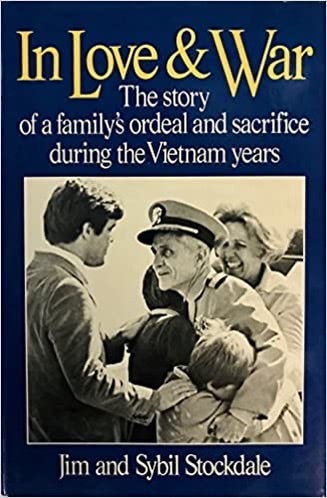“You must never confuse faith that you will prevail in the end—which you can never afford to lose—with the discipline to confront the most brutal facts of your current reality, whatever they might be.” — Admiral James Stockdale.
-this is a modification of an original shorter LinkedIn post
“Admiral James Stockdale was born on December 23, 1923 in Abingon, Illinois. After graduating from the Naval Academy in 1946, he attended flight training in Pensacola, FL and in 1954 was accepted to the Navy Test Pilot School where he served as an instructor for a brief time. Stockdale's flying career took him west, and in 1962 he earned a Master's Degree in International Relations from Stanford University (…)
On September 9, 1965, while returning from a mission in Vietnam, his A-4 Skyhawk was hit by anti-aircraft fire. Stockdale ejected, breaking a bone in his back and badly dislocating his knee. Stockdale wound up in Hoa Lo prison where he spent the next seven years where he was kept in solitary confinement for four years, in leg irons for two years and physically tortured more than 15 times. He was released from prison in 1973.” USNA (Unites States Naval Academy)
“Character is permanent, Issues are transient.”
James Stockdale
As the world grappled with the unexpected challenges brought on by the COVID-19 pandemic, many of us found ourselves reevaluating our perspectives on life and leadership. Looking back over the past two years since the world came to a standstill, a profound life lesson and leadership framework emerged from the pages of "Good to Great" by Jim Collins: the Stockdale Paradox.
In the early days of the pandemic, as teams went remote, I shared this lesson with my own team. The Stockdale Paradox centers on two critical aspects: unwavering faith in one's ability to prevail in the end, coupled with the discipline to confront the harsh realities of the present. It's a delicate balance of optimism and realism, where faith and discipline, focus and action unite to guide us through the toughest of challenges.
Faith and Discipline
Admiral James Stockdale's words resonate deeply with the essence of the paradox. During his seven-year ordeal as a prisoner of war, enduring torture and isolation, Stockdale firmly believed not only that he would eventually be free but that he would emerge stronger and transform the experience into a defining event of his life. This conviction, held steadfastly in the face of unimaginable adversity, propelled him forward and allowed him to maintain his resilience.
“I never doubted not only that I would get out, but also that I would prevail in the end and turn the experience into the defining event of my life, which, in retrospect I would not trade”
In his book, "In Love and War," co-authored with his wife Sybil, the story not only speaks of Stockdale's fortitude but also highlights the leadership demonstrated by his wife at home. While Admiral Stockdale remained strong in captivity, his wife showed unwavering faith in his return and took action to organize the national prisoners of war families' organization. This demonstration of leadership, both on the front lines and at home, showcases the power of collective determination.
The Stockdale Paradox teaches us a profound lesson in leadership—how to navigate even the most trying moments with wisdom and resolve. It emphasizes the importance of looking inward and developing mental strength to confront brutal facts rather than relying on unfounded optimism. In times of uncertainty, wishful thinking alone cannot guide us. Instead, it is through clarity of vision, mental resilience, and disciplined adaptation that we can create true strategies for change and growth.
Optimism for a better tomorrow is indeed essential, but it should not overshadow the need to face the challenges of today with courage and action. The paradox serves as a poignant reminder that leadership requires not only the ability to lead oneself wisely but also the capacity to influence others through character and action, ultimately leaving behind a lasting legacy.
As we navigate the ever-changing landscapes of life and leadership, let us embrace the profound lessons of the Stockdale Paradox. By removing blind spots and confronting brutal truths, we can forge a path forward with resilience, adaptability, and the strength to endure any storm that comes our way. We can make this paradox become a guide to lead us to strong lasting results in whatever we embark on, knowing that no matter how strong our faith in the clear vision ahead of us, we must confront every aspect or reality as it comes with a deep sense of realism and mental strength to look for the right solutions each step of the way.
P.S. Before I go, here you have “The Treat,” where I share some of the music that kept me company while writing … Enjoy as you bid farewell to this post
“Lead yourself, Learn to live. Lead others, Learn to Build.”
P.S. If you enjoyed reading this post consider subscribing to the newsletter for free, joining the community and sharing your thoughts.








I agree with Mr. Stockdale’s statement that “Character is permanent. Issues are transient”... On the other hand, it is issues that form the character. Only during the toughest times can we truly see who we are, what are our abilities and limitations. As transient as they are, issues create a permanent foundation for the development and growth of the character. A lot of people decide to shy away from their issues, choosing the path of false optimism as you well described it in your article. It’s equivalent to a state of continuous denial, which inevitably will result in a mental breakdown. I personally am a big supporter of a concept of “distinguishing realism”, a mental ability to assign appropriate levels of emotional response to various challenges... and to simply follow a Nike’s rule “Just do it” :)) I always remember an old Eastern European joke that differentiates the two concepts very well: “An optimist sees a light in the end of the tunnel. A realist sees that it’s actually a train moving towards them”...
Absolutely! Balance is a key word in all aspects of life and having self awareness and seeing the world around us as it truly is. I think we struggle to understand the real "us" because lots of subjectivity is involved, along so many other differen things such as culture, personally, background, etc. It's challenging to find a balance here as some people see themselves greater than they really are and others see themselves less than they really are. Have you had any challenge in finding balance in life?